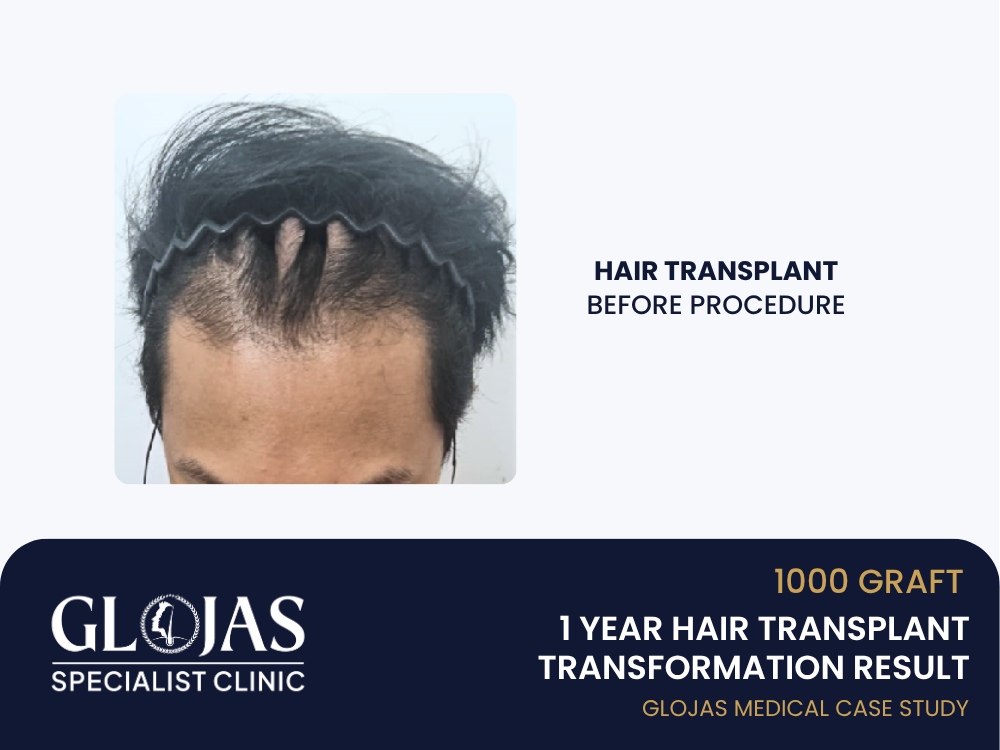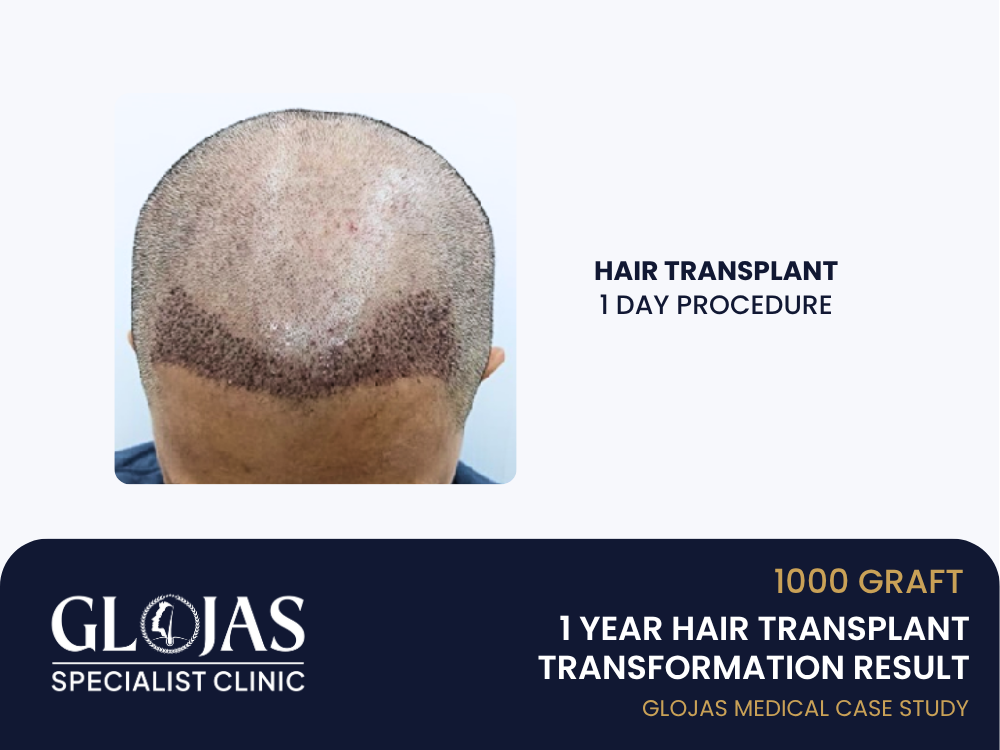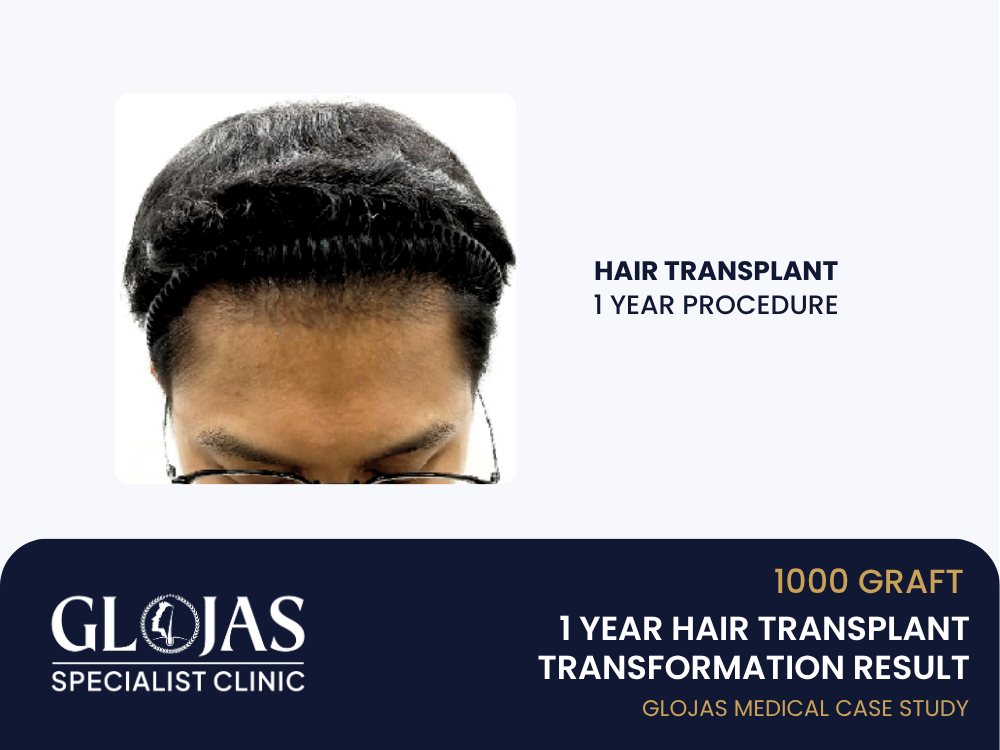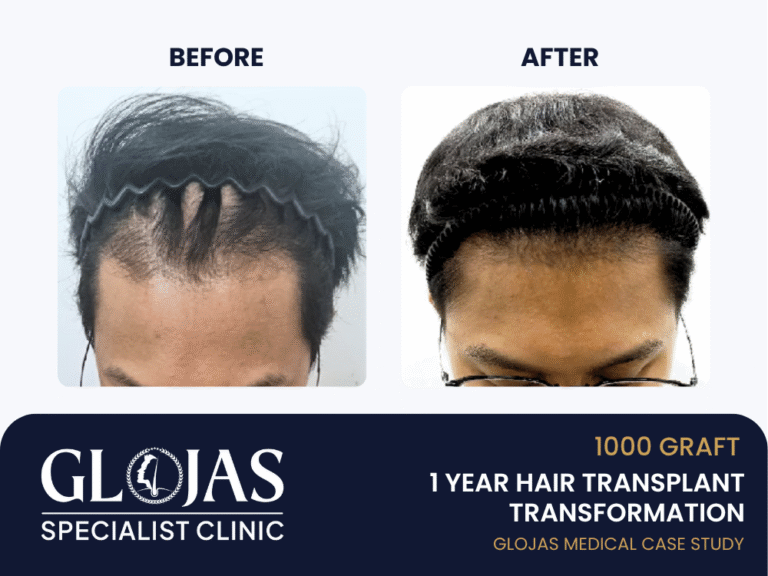For many men, a receding hairline and visibly wide forehead can be a source of concern. Even mild hairline recession can dramatically affect facial proportions and perceived age. In this case study, we follow a 32-year-old male patient who underwent a SMART™ FUE hair transplant using 1,000 grafts to correct early-stage recession and reduce the visual width of his forehead.
After just 12 months, the result is a more youthful, framed face, with a natural-looking hairline, improved facial balance, and restored confidence.
Patient Background
Name: Mr. Z (identity confidential)
Age: 32
Condition: Receding hairline (early Norwood 2–3), wide forehead
Hair Type: Straight, medium-fine, black
Donor Area: Good density, occipital scalp
Goal: Lower the hairline slightly, frame the face better, and correct temple recession
Mr. Z reported a slow but steady hairline recession starting in his late 20s. He had no crown thinning or vertex loss, but the temple areas were receding, making his forehead appear overly broad.
He was not interested in aggressive changes — just a refined, age-appropriate hairline to restore harmony between his forehead and facial features.
Why SMART™ FUE?
SMART™ FUE (Scalp Micro-Advanced Restoration Technique) is an enhanced version of Follicular Unit Extraction. It is ideal for precision work in high-visibility areas like the frontal hairline, due to its:
Ultra-fine punch tools (minimizing trauma and scarring)
High survival rate for grafts
Precise control over angle, depth, and direction of implantation
Natural, undetectable results
Faster healing and minimal downtime
SMART™ FUE hair transplant is particularly effective in hairline refinement and lowering, especially in patients with early-stage hair loss.
Consultation & Planning – Hair Transplant
During the consultation, the hair transplant specialist performed:
Scalp analysis using digital trichoscopy
Facial proportion mapping to guide hairline design
Donor density measurement
Hairline Design Goals:
Lower the hairline by approximately 1.5 cm
Maintain a soft, irregular hairline shape to mimic natural growth
Fill in temple corners subtly
Avoid flat, artificial symmetry
After assessment, 1,000 grafts were deemed sufficient to achieve the desired balance and density for the hairline zone.
Procedure Overview

Technique Used: SMART™ FUE Hair Transplant
Duration: 5 hours (outpatient)
Grafts Extracted: 1,000
Zones Treated: Frontal hairline and temple corners
Tools: 0.7 mm punch, implanter pen
Procedure Steps:
Local anesthesia was administered to the donor and recipient areas
Individual grafts extracted using a micro-punch
Grafts are sorted into single, double, and triple units
Recipient sites are created at a natural growth angle
Implantation is performed using implanters for precise placement
No stitches were needed. Recovery was fast and uneventful.
Post-Op Timeline

| Timeline | Progress |
|---|---|
| Day 1–3 | Redness, slight swelling in the hairline zone |
| Day 7 | Most scabs fall off naturally |
| Week 3–4 | Temporary shedding (shock loss phase) |
| Month 3 | First signs of regrowth |
| Month 6 | 60–70% visible improvement |
| Month 12 | Full result: improved density, contour, and natural framing |
1-Year Result

After 12 months, Mr. Z’s hairline looks seamless and natural. His wide forehead is now visually balanced, and the temples are filled in subtly to give a youthful contour without looking artificial.
| Before | After 1 Year |
|---|---|
| High forehead, sharp temple angles | Lowered hairline, temple closure, framed face |
| Sparse hair at the corners | Even density across the frontal hairline |
| Avoided exposing the forehead | Confidently styles hair back or parted naturally |
Patient Feedback
“I didn’t want a dramatic change — just something that looked natural. That’s exactly what I got. No one can tell I had anything done, but I look and feel better.”
Mr. Z expressed high satisfaction, noting improved confidence and freedom to style his hair without worry about exposing his hairline.
Maintenance & Follow-Up
No oral medications were taken post-op (personal choice)
Regular shampoo resumed after 10 days
Suggested PRP therapy every 6–12 months for long-term scalp health
Final evaluation done at 12 months; no further procedures needed
5 Frequently Asked Questions (FAQ)
1. Is 1,000 grafts enough to fix a receding hairline?
✅ Yes, for early hairline recession (Norwood 2–3), 1,000 grafts are sufficient to lower the hairline and fill in temples, especially with proper design.
2. Will the result look natural?
Absolutely. SMART™ FUE allows precise angle and density placement, for example, the frontal zone, making results indistinguishable from natural hair.
3. Will the transplanted hair fall out again?
No. The transplanted hair is resistant to DHT, so it behaves like natural, permanent hair — it can be cut, styled, and washed normally.
4. Is the forehead reduced?
No surgical forehead reduction is done. The appearance of a smaller forehead is achieved by lowering the hairline, which balances facial proportions.
5. Is it painful?
The procedure uses local anesthesia, so it’s virtually painless. Recovery is also comfortable, with only minor discomfort for the first few days.
Final Thoughts
This case illustrates how even a modest number of grafts (1,000), when combined with an advanced technique like SMART™ FUE, can lead to a significant improvement in facial aesthetics, confidence, and overall satisfaction.
For patients with early-stage recession or a wide forehead, this approach offers a minimally invasive, natural-looking, and permanent solution without drastic changes.
